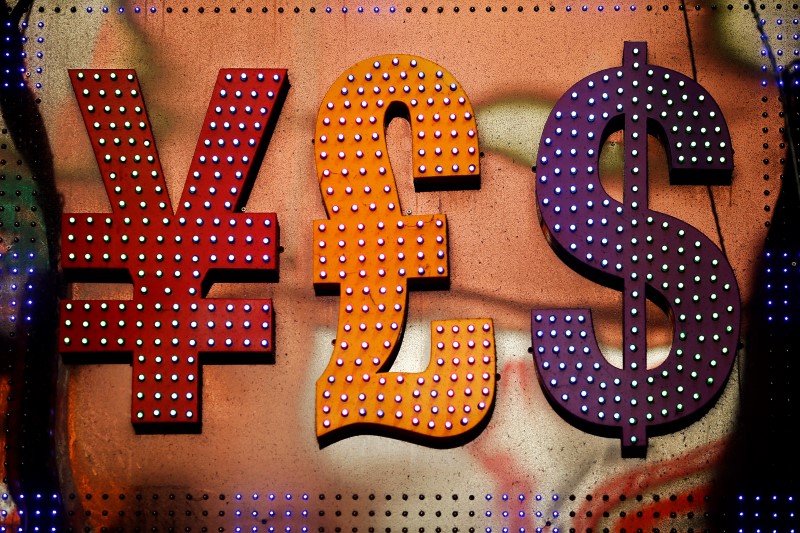By Sumanta Dey
(Reuters) - The Japanese yen is set to fall about 8 percent against the U.S. dollar over the coming year, said strategists in a Reuters poll, although many of them argue that Japanese policymakers are not likely to succeed in trying to engineer that outcome.
FX analysts are clinging to their weaker yen outlook, mostly on account of a stronger dollar view, despite a blistering rally in the yen over the past three months which came on the heels of a shock Bank of Japan decision to adopt negative interest rates.
In the meantime the BOJ has opted to provide no large new stimulus through its asset purchase program, a stance which emboldened many traders to push the yen
Data from the Commodities and Futures Trading Commission showed that U.S. dollar net short positions are at their highest in more than three years and net long bets on the yen are at their second highest ever.
That surge in bets, coupled with the BOJ holding fire, has helped to trim the scale of analysts' calls for a weaker yen.
In the survey of close to 70 foreign exchange strategists, taken during the period April 28-May 4, the yen is forecast to fall to 115 per dollar by end-April 2017, something they had predicted in last month's poll would happen by end-September.
On Wednesday the yen was trading near 107 per dollar.
But considering the poor track record forecasters have over the past year -- they had a 12-month call of 127 yen per dollar last May -- the bias for persisting with lower yen calls is a fraught one, especially given that the timing of the U.S. Federal Reserve's next rate hike remains uncertain.
On a separate question in the latest survey, the consensus among 23 respondents found that dollar/yen at 100 was the red line for Japanese policymakers.
A strong yen was a big factor behind the launch of Prime Minister Shinzo Abe's "Abenomics" economic stimulus program back in early 2013, when dollar/yen was below 90.
"Seeing the limitations of monetary policy in terms of influencing the exchange rate, even if the BOJ introduces more stimulus, we don't expect it to have a big impact on the yen," said Khoon Goh, ANZ's senior FX strategist for Asia.
ANZ was the only respondent in the sample of more than 60 who predicted the yen would rise to 100 per dollar in a year.
Asked what would be the most effective way for Japanese policymakers to weaken the yen, about a third of analysts said they would not succeed, no matter what they did.
Another third of the analysts said the most effective policy would be for the BOJ to significantly ramp up its asset purchases either on its own or combined with a lower negative deposit rate.
Most of the remaining respondents picked intervention in foreign exchange markets, which has been the subject of much speculation recently.
The BOJ has printed trillions of yen for the better part of the last two decades, buying everything from government bonds to exchange-traded funds, hoping the stimulus would find its way into the economy, end deflation and boost growth.
But apart from bloating its balance sheet to nearly 70 percent of Japan's gross domestic product and fuelling rallies in equities, the stimulus has not achieved much.
EURO TO SLIP TOO, BUT NOT BY MUCH
Similar to the BOJ, the European Central Bank also has a negative deposit rate and is buying 80 billion euros a month of mainly sovereign bonds. It will soon start buying corporate bonds.
Yet by end-April 2017 the euro is only predicted to go back to where it started this year -- $1.08, a fall of about six percent from $1.15 on Wednesday.
Only six strategists calling for the euro to reach or fall below parity to the dollar over the coming year are left in the sample, compared with 21 this time last year.
While nearly all central banks say they don't target them, a weaker exchange rate is crucial for the success of the BOJ and ECB's policies since it helps to import inflation and aids exports by making them relatively cheaper on global markets.
But the poll conclusions suggest the BOJ and ECB have little influence on the exchange rates of their respective currencies, which will more likely be affected by what the U.S. Federal Reserve does next with interest rates.
"The failure by the BOJ to act will now inevitably play into investor fears that 'Abenomics' is unraveling and that the BOJ is falling behind the curve," said Lee Hardman, currency analyst at BTMU in London.
A June Fed rate hike is still the main call among economists polled by Reuters last month, although their conviction is fading. Financial markets on the other hand are pricing in only a single hike for the year and that only in December. [ECILT/US]
